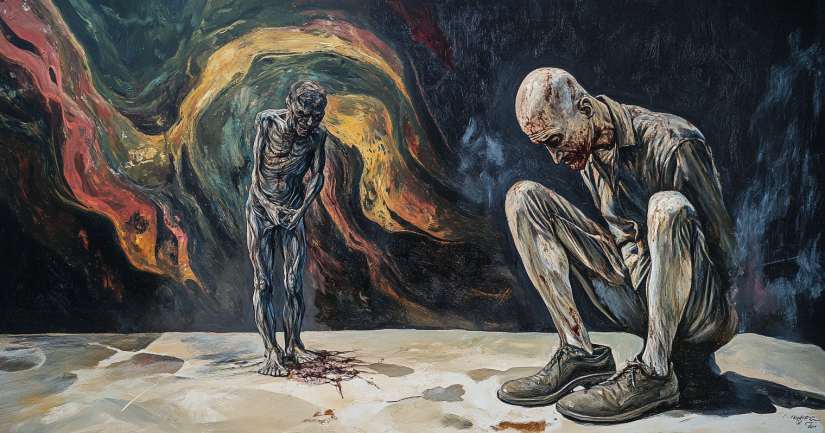
Explore the delicate balance of humor and despair in Waiting for Godot with our Act 2 Quiz, a journey into the heart of absurdity. This quiz on Act 2 invites you to explore the depths of Samuel Beckett’s masterpiece. The play, though seemingly simple, unfolds layers of existential questions. As you engage with each question, you’ll uncover the nuances of Vladimir and Estragon’s endless wait and the barren landscape that mirrors their despair.
Act 2 deepens the mystery. Characters evolve, yet remain trapped in their cyclical routines. Through this quiz, you will decipher their interactions and the subtle shifts in their dialogue. The barren tree, the passing boy, and the elusive Godot all play roles in this intricate dance of hope and futility.
The second act may bring closure, but your exploration of the play doesn’t have to end here! Go back and revisit the foundation with the Waiting For Godot Act 1 Quiz, or challenge yourself with a timeline of key events in the Waiting For Godot Order Of Events Quiz. Ready for the big test? See how well you remember it all in the Waiting For Godot Full Book Quiz.
By the end, you will gain a richer understanding of Beckett’s themes. Discover how silence speaks louder than words and how the absence of action forms the core of the narrative. Ready yourself for a journey through existential inquiry, where every response brings you closer to unlocking the play’s profound insights. Dive in and let the questions lead you through this timeless exploration.
Waiting for Godot Quizzes – Can you escape the loop of uncertainty?
What Happened – Waiting For Godot Act 2 Quiz
In Act 2 of Waiting for Godot, the setting remains the same as Act 1. Estragon and Vladimir are still waiting by the tree. Estragon’s boots are off, and he has forgotten the events of the previous day. Vladimir tries to remind Estragon about it. They talk about whether to leave or stay.
Pozzo and Lucky enter again, but Pozzo is now blind, and Lucky is mute. Pozzo falls down, and he needs help to get up. Vladimir and Estragon discuss helping them. Eventually, they help Pozzo stand. Pozzo does not remember meeting them before. He tells them that he has no idea who Godot is.
After Pozzo and Lucky leave, Vladimir and Estragon continue to wait. A boy arrives, just like in Act 1. The boy tells them that Godot will not come today but will come tomorrow. The boy says he does not remember meeting them before. He also says he works for Godot, taking care of his sheep.
The boy leaves, and Estragon and Vladimir are left alone again. They decide to leave but do not move. The curtain falls, ending the act.
Waiting For Godot Act 2 – Quotes
- “Nothing to be done.” – Estragon, ‘Expressing his resignation to the repetitive and futile nature of their situation.’
“We always find something, eh Didi, to give us the impression we exist?” – Estragon, ‘Highlighting their struggle to find meaning in their mundane existence.’
“Let’s go.” “We can’t.” “Why not?” “We’re waiting for Godot.” – Vladimir and Estragon, ‘Reiterating their endless wait for an elusive figure.’
“All my life I’ve compared myself to him.” – Pozzo, ‘Reflecting on his relationship with Lucky and his own identity.’
“They give birth astride of a grave, the light gleams an instant, then it’s night once more.” – Pozzo, ‘A philosophical musing on the brevity and futility of life.’
“You must go on. I can’t go on. I’ll go on.” – Vladimir, ‘Illustrating the paradox of human perseverance amidst despair.’
“Was I sleeping, while the others suffered?” – Estragon, ‘Questioning his awareness and engagement with the suffering around him.’
“We’re not tied?” – Estragon, ‘A moment of realization about their perceived versus actual freedom.’
“The tears of the world are a constant quantity.” – Pozzo, ‘Pondering the unchanging nature of human suffering.’
“Let us not waste our time in idle discourse!” – Vladimir, ‘Urging a focus on action despite their inaction.’
Waiting For Godot Act 2 – FAQ
The primary theme of Act 2 is the persistence of hope amid existential uncertainty. The characters continue to wait for Godot, despite the ambiguity of his arrival, reflecting the human condition’s struggle with meaning and purpose.
The setting in Act 2 remains largely unchanged from Act 1, maintaining its minimalistic and barren appearance. However, subtle differences, such as the presence of a few leaves on the previously barren tree, suggest a passage of time and potential for change.
Vladimir and Estragon’s relationship in Act 2 underscores themes of companionship and dependence. Their interactions reveal deep-seated reliance on one another for emotional support and distraction from their monotonous waiting, highlighting the importance of human connection.
The arrival of Pozzo and Lucky in Act 2 introduces a cyclical sense of time and reinforces the play’s absurdist elements. Their changed circumstances—Pozzo’s blindness and Lucky’s muteness—further illustrate the unpredictability and transient nature of existence.
Repetition in Act 2 serves to emphasize the monotony and futility of the characters’ wait. By mirroring actions and dialogue from Act 1, Beckett highlights the endless cycle of hope and despair, underscoring the play’s existential themes
